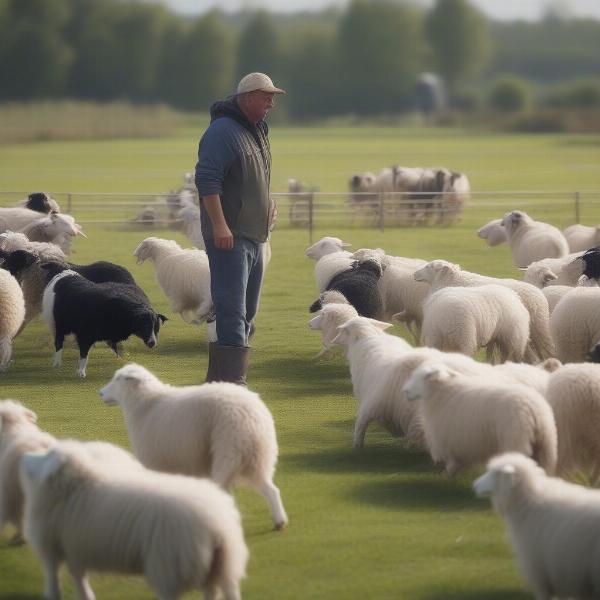Farmyard dogs are more than just pets; they’re integral members of many agricultural operations around the world. These versatile canines contribute to the smooth running of farms in various ways, from herding livestock and protecting property to offering companionship and deterring pests. This comprehensive guide explores the world of farmyard dogs, delving into their various roles, suitable breeds, specific needs, and how to ensure their well-being in this unique environment.
Choosing the Right Farmyard Dog
The ideal farmyard dog breed depends largely on the specific needs of the farm. Herding dogs, like Border Collies and Australian Shepherds, excel at managing livestock with their intelligence and agility. Guardian breeds, such as Great Pyrenees and Anatolian Shepherds, are naturally protective and deter predators. Other breeds, like Jack Russell Terriers, are skilled ratters and keep vermin populations in check. Consider your farm’s size, the type of livestock you have, and the level of predator threat when selecting a breed.
Health and Care for Your Farmyard Dog
Farmyard dogs face unique health challenges due to their environment. Regular veterinary checkups, vaccinations, and parasite prevention are crucial. Exposure to pesticides and farm chemicals should be minimized, and access to fresh water and shade is essential, especially during hot weather. Providing a balanced diet tailored to their activity level and specific needs is vital for maintaining their health and stamina.
Training and Socialization for Farm Dogs
Training is crucial for any dog, but it’s especially important for farmyard dogs. Basic obedience commands, like “come,” “stay,” and “leave it,” are fundamental. Herding dogs require specialized training to effectively manage livestock, while guardian breeds benefit from socialization with the animals they’ll protect. Early socialization with various people, animals, and environments helps them develop into well-adjusted and reliable working partners.
 Training and Socializing Farm Dogs
Training and Socializing Farm Dogs
Providing a Safe and Enriching Environment
While farmyard dogs are working animals, they also need a safe and stimulating environment. A secure kennel or designated area provides shelter from the elements and a place to rest. Providing toys, opportunities for play, and regular interaction with family members helps prevent boredom and promotes their overall well-being. Remember, a happy and well-cared-for dog is a more productive and reliable working partner.
The Special Case of Livestock Guardian Dogs
Livestock guardian dogs (LGDs) play a unique role on the farm. They live amongst the livestock, forming strong bonds and becoming integrated into the herd or flock. This close proximity allows them to effectively deter predators and protect the animals they guard. Understanding the specific needs of LGDs, such as early bonding with livestock and ongoing socialization, is crucial for their success in this role.
Conclusion: The Invaluable Role of Farmyard Dogs
Farmyard dogs are valuable assets to any agricultural operation. Their diverse skills, from herding and guarding to pest control and companionship, contribute significantly to the success of farms worldwide. By understanding their specific needs and providing proper care, training, and a stimulating environment, you can ensure your farmyard dog thrives and fulfills its important role as a trusted working partner and loyal companion.
FAQ
-
What are the best breeds for guarding poultry? Breeds like Great Pyrenees, Akbash, and Maremmas are commonly used for guarding poultry.
-
How much exercise does a farmyard dog need? The exercise needs vary depending on the breed and their specific role, but all dogs need regular physical and mental stimulation.
-
Is it safe to have a farmyard dog around children? With proper training and socialization, most farmyard dogs can coexist safely with children.
-
What should I feed my farmyard dog? A high-quality dog food formulated for active dogs is generally suitable, but consult with your veterinarian for specific dietary recommendations.
-
How can I prevent my farmyard dog from chasing livestock? Early training and socialization are key to preventing livestock chasing. Professional training may be necessary in some cases.
-
How can I introduce a new dog to my existing farm animals? Introduce them gradually and under supervision, allowing them to get accustomed to each other’s presence over time.
-
Where can I find a reputable breeder of farmyard dogs? Research breeders carefully, looking for those who prioritize health and temperament and are knowledgeable about the specific breeds they raise.
For expert advice and personalized guidance on choosing, training, and caring for your farmyard dog, contact a qualified veterinarian or professional dog trainer.
About ILM Dog
ILM Dog offers expert advice on dog breeds, health, training, nutrition, grooming, and much more. We are dedicated to providing dog owners worldwide with reliable, practical information to help them care for their canine companions. From choosing the right breed to understanding their unique health needs, ILM Dog is your trusted resource for all things dog-related. Contact us today for personalized support and guidance: Email: [email protected], Phone: +44 20-3965-8624.